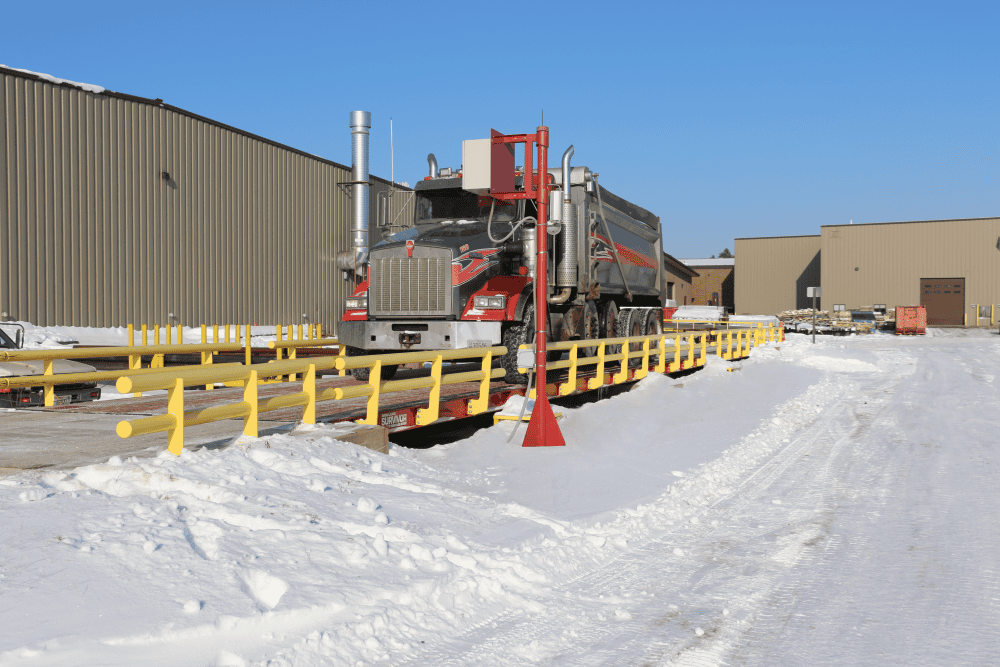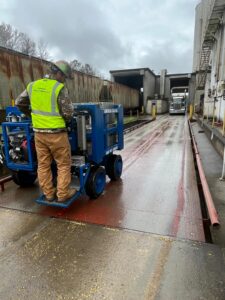 As the cold season approaches, scales begin to face unique challenges in environments where cold weather has a bigger effect on weighing accuracy. Whether you are operating in logistics, agriculture, mining, or any field that relies on weighing systems, cold weather can introduce issues that may compromise accuracy, reliability, and longevity. Understanding these challenges and implementing preventative scale maintenance can ensure your operations continue smoothly during the winter months.
As the cold season approaches, scales begin to face unique challenges in environments where cold weather has a bigger effect on weighing accuracy. Whether you are operating in logistics, agriculture, mining, or any field that relies on weighing systems, cold weather can introduce issues that may compromise accuracy, reliability, and longevity. Understanding these challenges and implementing preventative scale maintenance can ensure your operations continue smoothly during the winter months.
How Cold Weather Impacts Industrial Scales
Mechanical Components
Scales are often built to withstand harsh environments with extreme temperature and environmental changes, but extreme cold can still affect their mechanical components. One of the main components that can be affected are load cells, which are the core for most weighing systems, and are susceptible to temperature changes. Since load cells are constructed of steel and aluminum, they can contract in freezing conditions, thus leading to errors or reduced accuracy. Scales used in outdoor environments like truck scales, and platform scales are more susceptible to these issues. Cold temperatures can also cause the metal components to become brittle, increasing the risk of damage or failure under heavy loads.
Pro Tip: Ensure that your scales are designed for the specific temperature range by consulting the owner manual to see what the temperature rating is for your scale model. Many load cells come with features to help better deal with the temperature changes, but regular calibration during colder months is essential. This calibration will account for any drift in accuracy caused by temperature shifts.
Electronic Components and Moisture
Unfortunately, cold weather introduces another problem: condensation. When temperatures fluctuate, electronic components, such as wiring, circuit boards, junction boxes and displays, can suffer from moisture buildup. There are many cases of scales reading inaccurate measurements due to moisture buildup. Moisture can lead to short circuits, false readings, or complete system failures, especially in environments where scales are exposed to snow, rain, or ice. This is not exclusive to outside environments either, this also can happen in environments where washing down the scale is required.
Pro Tip: One way you can protect electronics is by ensuring all weatherproof enclosures are sealed correctly. Most manufacturers offer custom indicators for the correct environment. Outfitting your indicator with the correct accessories can help prevent moisture buildup. Regularly inspect and maintain moisture seals, particularly around junction boxes and displays. Some scales are equipped with heating elements to prevent condensation buildup inside, so confirm they are working properly.
Battery and Power Issues
Battery-powered weighing systems are especially vulnerable in cold temperatures. Cold temperatures slow the chemical reactions within batteries, reducing their ability to hold a charge. You might notice when your car has been sitting for too long in the winter, it may be harder or slow to start. This is due to the slowing reaction in the battery. This issue can result in shorter operational times for portable scales and increased downtime.
Pro Tip: In cold temperatures, lithium-ion batteries tend to perform better than other types. If switching batteries is not doable, then ensure that batteries are fully charged, and keep backups readily available. Keeping a chart for battery rotation can help simplify the process. For stationary scales, regularly inspecting the power supply can help prevent power surges that may affect scale functionality.
Environmental Factors: Wind and Ice
Outdoor scales face additional challenges beyond temperature. Wind can affect the precision of weighing equipment, particularly when it comes to delicate measurements like on precision platform or floor scales. Additionally, snow or ice accumulation on the weighing platform can alter weight readings or cause surface damage.
Pro Tip: Install windbreaks or shielding structures around outdoor scales to mitigate the effect of high winds. For ice and snow, routine clearing of the scale surface is crucial to ensure accuracy. Anti-icing treatments can also be applied to prevent ice buildup and consider using heating elements for the platform to keep snow from accumulating. Consulting your local scale company may provide various options for installations.
Cold Weather Effects on Specific Weighing Applications
Truck Scales
Truck scales, commonly used in logistics, aggregates, and mining, are heavily affected by cold weather. In freezing conditions, the metal components of these large scales can contract, affecting the accuracy of load measurements. Additionally, ice buildup can lead to incorrect readings or mechanical failure.
Preventative Maintenance:
- Regularly inspect and clear scales of ice and snow.
- Use covers or heated platforms where applicable.
- Ensure the load cell is temperature compensated and routinely calibrated.
Agricultural Scales
Scales in agricultural environments, such as livestock scales or hopper scales for weighing bulk feed, are often exposed to outdoor conditions and temperature fluctuations. Moisture from snow or sleet can compromise both the mechanical and electronic components of these scales.
Preventative Maintenance:
- Check the scale’s waterproofing measures and repair any worn seals.
- Implement regular cleaning routines to prevent ice buildup.
- Store portable scales in temperature-controlled environments when not in use.
Mining and Aggregate Weighing Systems
Weighing equipment in mining and quarrying, such as belt scales, and platform scales are frequently exposed to freezing temperatures, wind, and wet conditions. In these industries, accurate weight measurements are vital for efficient material handling, transport, and fair trade.
Preventative Maintenance:
- Schedule frequent calibration during cold months to account for temperature-induced inaccuracies.
- Ensure load cells are equipped with insulation practices (heaters, industrial heating wraps, etc.)
- Inspect mounting hardware for signs of damage due to metal contraction.
Warehouse and Industrial Scales
In indoor settings, such as warehouses or manufacturing facilities, the cold might not be as extreme, but poor heating or drafts can still cause significant temperature changes. This is especially relevant in large, open spaces where temperatures can drop significantly overnight or during downtimes. When using scales in environments that wash down the scales (food processing, poultry, etc.) there is a high chance of sitting moisture being present.
Preventative Maintenance:
- Monitor indoor temperatures to ensure they remain within the scale’s operational range.
- Perform routine checks of electronic components and sensors to ensure they are free of moisture or condensation.
- Consider installing a climate control system in the weighing area.
Preventative Maintenance Tips for Winter
Regular Calibration 
In cold weather, it is essential to increase the frequency of calibration checks. Temperature variations can cause slight shifts in readings, and regular calibration will help maintain accuracy. Generally, you want to schedule calibration checks annually or twice a year. But with these conditions, it is better to have calibration checks quarterly if not more depending on frequency of use.
Inspect and Replace Seals
Moisture can be particularly damaging to scales during the winter months. Inspect seals and gaskets regularly, replacing any that show signs of wear or cracks. Waterproofing measures should be thoroughly tested before the onset of freezing temperatures.
Keep Equipment Clean
Snow, ice, and salt used for de-icing roads can accumulate on scales, leading to corrosion or mechanical wear. Regular cleaning is essential to prevent damage. Use gentle, non-corrosive cleaning agents and avoid pressure washers, which can force water into sensitive components. Scale companies often offer scale cleaning services that help keep the load cells, and underside of the scale clean and free of debris.
Protect Against Power Surges
Cold weather can cause power fluctuations, which may damage electronic weighing systems. Ensure your scales are connected to surge protectors and regularly inspect electrical components for wear.
Store Scales Properly
For portable or seasonal scales, proper storage is crucial. Store equipment in temperature-controlled environments to prevent cold-induced damage, and perform full system checks before bringing scales back into operation.
Cold weather can present numerous challenges for industrial scales, but with the right preventative measures, you can ensure reliable performance and accurate readings throughout the winter months. Whether you are operating truck scales, agricultural scales, or precision industrial systems, taking the time to maintain and protect your equipment will pay off overall by reducing downtime, improving accuracy, and extending the life of your scales. Be proactive this winter and keep your weighing systems operating at peak performance.
